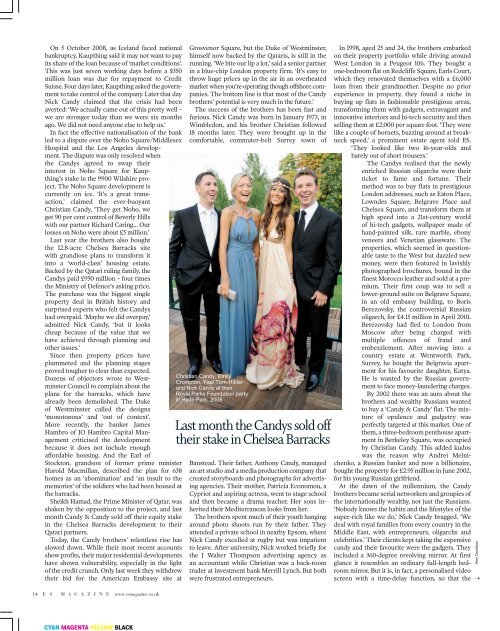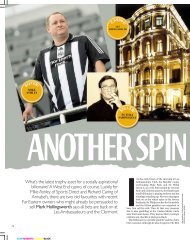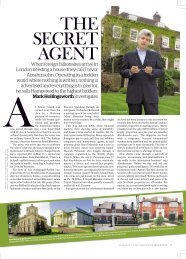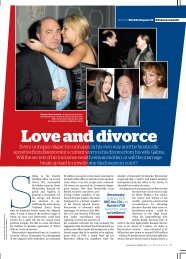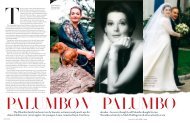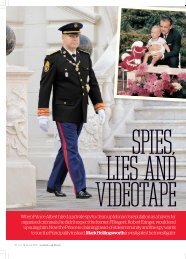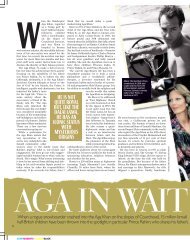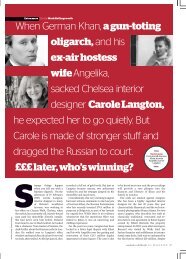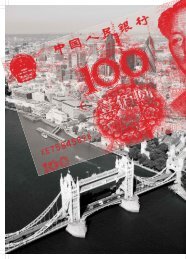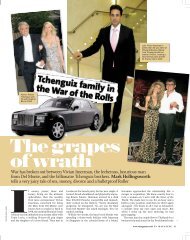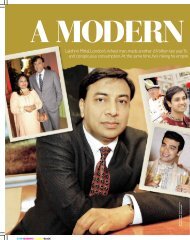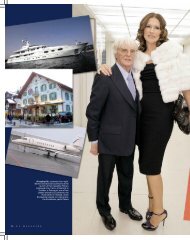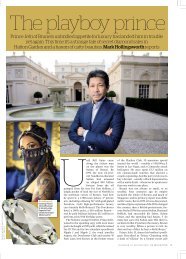Sold out:Chelsea Barracks For sale:Candyscape - Mark Hollingsworth
Sold out:Chelsea Barracks For sale:Candyscape - Mark Hollingsworth
Sold out:Chelsea Barracks For sale:Candyscape - Mark Hollingsworth
Create successful ePaper yourself
Turn your PDF publications into a flip-book with our unique Google optimized e-Paper software.
CYAN MAGENTA YELLOW BLACK<br />
On 5 October 2008, as Iceland faced national<br />
bankruptcy, Kaupthing said it may not want to pay<br />
its share of the loan because of ‘market conditions’.<br />
This was just seven working days before a $350<br />
million loan was due for repayment to Credit<br />
Suisse. Four days later, Kaupthing asked the government<br />
to take control of the company. Later that day<br />
Nick Candy claimed that the crisis had been<br />
averted: ‘We actually came <strong>out</strong> of this pretty well –<br />
we are stronger today than we were six months<br />
ago. We did not need anyone else to help us.’<br />
In fact the effective nationalisation of the bank<br />
led to a dispute over the Noho Square/Middlesex<br />
Hospital and the Los Angeles development.<br />
The dispute was only resolved when<br />
the Candys agreed to swap their<br />
interest in Noho Square for Kaupthing’s<br />
stake in the 9900 Wilshire project.<br />
The Noho Square development is<br />
currently on ice. ‘It’s a great transaction,’<br />
claimed the ever-buoyant<br />
Christian Candy, ‘They get Noho, we<br />
get 90 per cent control of Beverly Hills<br />
with our partner Richard Caring… Our<br />
losses on Noho were ab<strong>out</strong> £5 million.’<br />
Last year the brothers also bought<br />
the 12.8-acre <strong>Chelsea</strong> <strong>Barracks</strong> site<br />
with grandiose plans to transform it<br />
into a ‘world-class’ housing estate.<br />
Backed by the Qatari ruling family, the<br />
Candys paid £950 million – four times<br />
the Ministry of Defence’s asking price.<br />
The purchase was the biggest single<br />
property deal in British history and<br />
surprised experts who felt the Candys<br />
had overpaid. ‘Maybe we did overpay,’<br />
admitted Nick Candy, ‘but it looks<br />
cheap because of the value that we<br />
have achieved through planning and<br />
other issues.’<br />
Since then property prices have<br />
plummeted and the planning stages<br />
proved tougher to clear than expected.<br />
Dozens of objectors wrote to Westminster<br />
Council to complain ab<strong>out</strong> the<br />
plans for the barracks, which have<br />
already been demolished. The Duke<br />
of Westminster called the designs<br />
‘monotonous’ and ‘<strong>out</strong> of context’.<br />
More recently, the banker James<br />
Hambro of JO Hambro Capital Management<br />
criticised the development<br />
because it does not include enough<br />
affordable housing. And the Earl of<br />
Stockton, grandson of former prime minister<br />
Harold Macmillan, described the plan for 638<br />
homes as an ‘abomination’ and ‘an insult to the<br />
memories’ of the soldiers who had been housed at<br />
the barracks.<br />
Sheikh Hamad, the Prime Minister of Qatar, was<br />
shaken by the opposition to the project, and last<br />
month Candy & Candy sold off their equity stake<br />
in the <strong>Chelsea</strong> <strong>Barracks</strong> development to their<br />
Qatari partners.<br />
Today, the Candy brothers’ relentless rise has<br />
slowed down. While their most recent accounts<br />
show profits, their major residential developments<br />
have shown vulnerability, especially in the light<br />
of the credit crunch. Only last week they withdrew<br />
their bid for the American Embassy site at<br />
14 E S M A G A Z I N E www.esmagazine.co.uk<br />
Grosvenor Square, but the Duke of Westminster,<br />
himself now backed by the Qataris, is still in the<br />
running. ‘We bite our lip a lot,’ said a senior partner<br />
in a blue-chip London property firm. ‘It’s easy to<br />
throw huge prices up in the air in an overheated<br />
market when you’re operating though offshore companies.<br />
The bottom line is that most of the Candy<br />
brothers’ potential is very much in the future.’<br />
The success of the brothers has been fast and<br />
furious. Nick Candy was born in January 1973, in<br />
Wimbledon, and his brother Christian followed<br />
18 months later. They were brought up in the<br />
comfortable, commuter-belt Surrey town of<br />
Christian Candy, Emily<br />
Crompton, Yael Torn-Hibler<br />
and Nick Candy at their<br />
Royal Parks Foundation party<br />
in Hyde Park, 2008<br />
Last month the Candys sold off<br />
their stake in <strong>Chelsea</strong> <strong>Barracks</strong><br />
Banstead. Their father, Anthony Candy, managed<br />
an art studio and a media production company that<br />
created storyboards and photographs for advertising<br />
agencies. Their mother, Patricia Economou, a<br />
Cypriot and aspiring actress, went to stage school<br />
and then became a drama teacher. Her sons inherited<br />
their Mediterranean looks from her.<br />
The brothers spent much of their y<strong>out</strong>h hanging<br />
around photo shoots run by their father. They<br />
attended a private school in nearby Epsom, where<br />
Nick Candy excelled at rugby but was impatient<br />
to leave. After university, Nick worked briefly for<br />
the J Walter Thompson advertising agency as<br />
an accountant while Christian was a back-room<br />
trader at investment bank Merrill Lynch. But both<br />
were frustrated entrepreneurs.<br />
In 1998, aged 25 and 24, the brothers embarked<br />
on their property portfolio while driving around<br />
West London in a Peugeot 106. They bought a<br />
one-bedroom flat on Redcliffe Square, Earls Court,<br />
which they renovated themselves with a £6,000<br />
loan from their grandmother. Despite no prior<br />
experience in property, they found a niche in<br />
buying up flats in fashionable prestigious areas,<br />
transforming them with gadgets, extravagant and<br />
innovative interiors and hi-tech security and then<br />
selling them at £2,000 per square foot. ‘They were<br />
like a couple of hornets, buzzing around at breakneck<br />
speed,’ a prominent estate agent told ES.<br />
‘They looked like two 16-year-olds and<br />
barely <strong>out</strong> of short trousers.’<br />
The Candys realised that the newly<br />
enriched Russian oligarchs were their<br />
ticket to fame and fortune. Their<br />
method was to buy flats in prestigious<br />
London addresses, such as Eaton Place,<br />
Lowndes Square, Belgrave Place and<br />
<strong>Chelsea</strong> Square, and transform them at<br />
high speed into a 21st-century world<br />
of hi-tech gadgets, wallpaper made of<br />
hand-painted silk, rare marble, ebony<br />
veneers and Venetian glassware. The<br />
properties, which seemed in questionable<br />
taste to the West but dazzled new<br />
money, were then featured in lavishly<br />
photographed brochures, bound in the<br />
finest Morocco leather and sold at a premium.<br />
Their first coup was to sell a<br />
lower-ground suite on Belgrave Square,<br />
in an old embassy building, to Boris<br />
Berezovsky, the controversial Russian<br />
oligarch, for £4.15 million in April 2001.<br />
Berezovsky had fled to London from<br />
Moscow after being charged with<br />
multiple offences of fraud and<br />
embezzlement. After moving into a<br />
country estate at Wentworth Park,<br />
Surrey, he bought the Belgravia apartment<br />
for his favourite daughter, Katya.<br />
He is wanted by the Russian government<br />
to face money-laundering charges.<br />
By 2002 there was an aura ab<strong>out</strong> the<br />
brothers and wealthy Russians wanted<br />
to buy a ‘Candy & Candy’ flat. The mixture<br />
of opulence and gadgetry was<br />
perfectly targeted at this market. One of<br />
them, a three-bedroom penthouse apartment<br />
in Berkeley Square, was occupied<br />
by Christian Candy. This added kudos<br />
was the reason why Andrei Melnichenko,<br />
a Russian banker and now a billionaire,<br />
bought the property for £2.95 million in June 2002,<br />
for his young Russian girlfriend.<br />
At the dawn of the millennium, the Candy<br />
brothers became serial networkers and groupies of<br />
the internationally wealthy, not just the Russians.<br />
‘Nobody knows the habits and the lifestyles of the<br />
super-rich like we do,’ Nick Candy bragged. ‘We<br />
deal with royal families from every country in the<br />
Middle East, with entrepreneurs, oligarchs and<br />
celebrities.’ Their clients kept taking the expensive<br />
candy and their favourite were the gadgets. They<br />
included a 360-degree revolving mirror. At first<br />
glance it resembles an ordinary full-length bedroom<br />
mirror. But it is, in fact, a personalised video<br />
screen with a time-delay function, so that the<br />
Alan Davidson<br />
→


